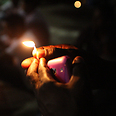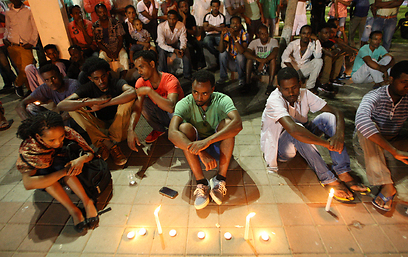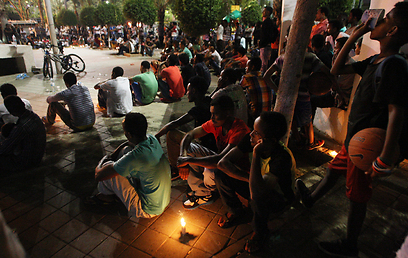
200 Eritreans mark World Refugee Day in Tel Aviv
Gathering in Levinsky park, immigrants, asylum seekers honor oppressive regime's victims, voice concern for future in light of Israel's intention to deport them; 'We didn't choose to be refugees,' says Davit Damuz, 26, calls Israel to grant refugee status
Thursday marks World Refugee Day, and on Wednesday's evening 200 Eritrean asylum seekers gathered in Tel Aviv's Levinsky Park to honor the victims of autocrat Isaias Afewerki, Eritrea's president since 1993.
Participants hoisted Israeli and Eritrean flags and lit candles in memory of the thousands of casualties in the long feud with Ethiopia.
Related stories:
- Eritreans doubt they'll be transferred to third country
- Illegal migrants find 'no peace' in Israel
- Eritrean infiltrates, vandalizes IDF base
"Millions have left Eritrea. Over the last years we've become a nation of refugees. It's important to respect the memory of the people who fought so we can return to our homeland," asylum seeker Davit Damuz, 26, told Ynet.

Eritreans in memorial service (Photo: Yaron Brenner)
"We didn't choose to be refugees, but the dictatorial regime in my country turned us into such after depriving rights, outlawing parties and jailing people who refused to serve in the army," he added.
According to him, he escaped Eritrea when he was 21, and arrived in Israel in 2010. "At that age I should have been studying but I was conscripted, without knowing for how long. It's not an army – it's hard physical labor for dozens of years.

(Photo: Yaron Brener)
"I left behind parents and siblings, and I miss them to no end, but if I return I'll be welcomed with death or imprisonment for the rest of my life," he said.
According to the Population and Immigration Authority, 55,000 illegal immigrants and asylum seekers reside in Israel, about 40,000 of which are from Eritrea and 15,000 from Sudan.
Since June 2012, some 2,000 of these were jailed without a trial in detainment facilities for a period of at least three years, in accordance with the amended infiltration law.
Eritrea has one of the highest rates of refugees in the world, but over recent years Israel did not check the immigrants' eligibility for refugee status, despite the fact that 75% of Eritreans worldwide are recognized as refugees.
Though according to international law, Israel cannot deport Eritreans back to their home country, Israel may start deporting Eritreans in the coming months, after the State announced to the High Court that a deal has been reached with a third country which has agreed to host the immigrants.
This new development arose in conversation among the asylum seekers in Tel Aviv, some of them expressing anger and concern for the future.
"Israel doesn't recognize us as refugees but that's what we are, and the whole world admits that," Damuz said.
According to him, "No one chooses to be a refugee. My dream is that on next year's Refugee Day I'll return to my homeland and this situation will be over."
- Receive Ynetnews updates directly to your desktop










